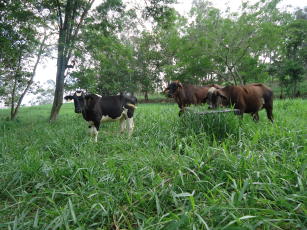Unit
Embrapa Dairy Cattle
Soil quality and performance of Brachiaria decumbens in pastures with or without trees

Photo: PACIULLO, Domingos Sávio Campos
Silvopastoral systems may be an option to prevent grassland degradation because of the potential to control erosion and the ability of some tree species to add nitrogen and other nutrients to pasture, improving soil fertility. In view of this potential, in-depth evaluations of the soil and plant components of these systems are critical. The objective of this project was to verify the effect of trees on soil quality (fertility, biomass and microbial activity) and to evaluate the dry matter production, the botanical composition, and the nutritive value of the forage. The following variables were evaluated: temperature, humidity, biomass and microbial activity and soil fertility, canopy light interception; dry matter production, morphological composition, chemical composition and pasture digestibility. The results allowed improving the knowledge of the zone of influence of the trees in the pasture, which could help in the selection of spacing levels among tree tracks, as well as the tree density. In addition, there is the potential to contribute to the recovery and development of areas with degraded pastures by improving soil fertility, as feasible through the presence of leguminous trees.
Ecosystem: Atlantic Forest
Status: Completed Start date: Thu Mar 01 00:00:00 GMT-03:00 2007 Conclusion date: Sat Feb 28 00:00:00 GMT-03:00 2009
Head Unit: Embrapa Dairy Cattle
Project leader: Domingos Savio Campos Paciullo
Contact: domingos.paciullo@embrapa.br